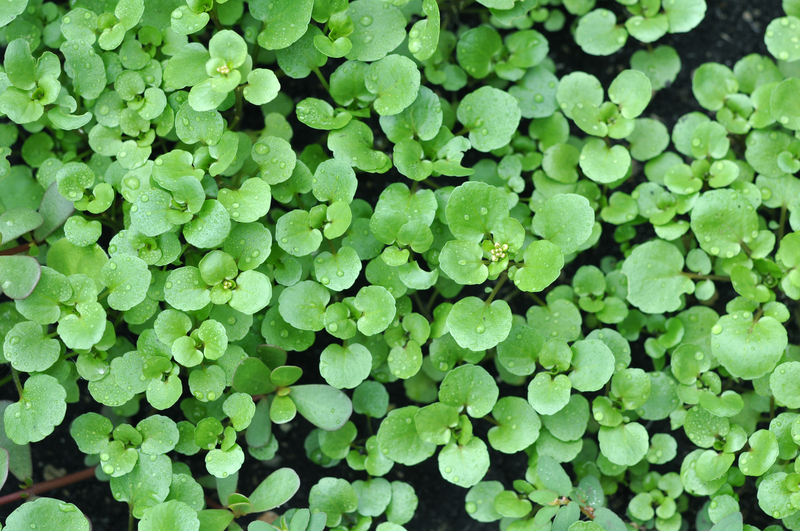Sustainability Starts at Home: Gardening's Climate Benefits
Posted on 16/06/2025
Sustainability Starts at Home: Gardening's Climate Benefits
Climate change ranks among the most pressing issues of our time, with global leaders and citizens alike grappling for strategies to reduce carbon emissions and protect Earth's future. Yet, while far-reaching policies and technological innovations are crucial, the seeds of sustainability may be planted much closer to home. Home gardening stands out as a surprisingly powerful tool to help shape a greener planet.
Understanding Home Gardening and Its Impact on Sustainability
Home gardens aren't just pleasant spaces to relax or grow your favorite flowers and vegetables; they're hubs of environmental change. Sustainable gardening refers to cultivating plants in a way that conserves resources, supports biodiversity, and reduces environmental impact. By transforming our yards, balconies, and windowsills into vibrant gardens, we can meaningfully contribute to a healthier ecosystem and a more sustainable climate.
Why Does Sustainability Begin at Home?
- Accessible Solutions: Individuals and families can make immediate, measurable impacts through home-based efforts.
- Educational Opportunities: Home gardening teaches children and adults about the intricate connections between plants, animals, and the climate.
- Community Inspiration: Local gardening inspires neighbors and friends, encouraging collective action for broader environmental benefit.

How Does Home Gardening Benefit the Climate?
Maintaining a sustainable garden might seem like a small step, but the collective impact can be huge. Here's how gardening practices translate to significant climate benefits:
1. Carbon Sequestration: Turning Soil into a Carbon Sink
Gardens are natural carbon sinks. Through photosynthesis, plants absorb carbon dioxide (CO2), a major greenhouse gas, from the atmosphere and store it in their tissues and surrounding soil.
- Trees and shrubs, in particular, capture large amounts of CO2 during their growth.
- Compost-enriched soil can further lock in carbon, making a home garden an effective tool for reducing your carbon footprint.
When you plant more perennials, trees, and dense vegetation, you maximize your garden's carbon-capturing potential.
2. Reducing Food Miles: Fresh Produce, Lower Emissions
Did you know the average fruit or vegetable in stores travels up to 1,500 miles before your plate? That's a lot of fossil fuel consumption for transportation. By growing food at home:
- You eliminate the need for long-distance shipping.
- You reduce packaging demands and processing emissions.
- Produce is picked at peak ripeness, preserving nutrition and flavor.
In essence, homegrown gardens drastically lower the carbon emissions associated with food production and transport, translating into direct climate benefits.
3. Promoting Local Biodiversity and Ecosystem Balance
A diverse garden isn't just beautiful--it's ecologically vital. Native plants, wildflowers, and a mix of vegetables invite bees, butterflies, and other pollinators to thrive.
- Supporting pollinators sustains food systems and healthy plant reproduction.
- Wildlife such as birds and beneficial insects help maintain pest control, decreasing your reliance on chemical pesticides.
- Preservation of native plant species protects local ecosystems.
Encouraging biodiversity at home leads to more resilient local environments, bolstering climate adaptation and food security.
4. Minimizing Waste and Inspiring a Circular Economy
Home gardeners often discover the power of composting organic kitchen scraps, leaves, and yard trimmings. This not only reduces landfill waste--where organic material would otherwise emit methane, a potent greenhouse gas--but also closes the nutrient cycle by returning valuable matter to the soil.
- Composting transforms waste into natural fertilizer.
- Mulching reduces the need for chemical inputs and retains soil moisture.
- Creative reuse (such as upcycling containers or rain barrels) saves resources and money.
If every household participated in these waste-reducing gardening practices, the collective climate benefit would be transformative.
5. Reducing Urban Heat and Increasing Climate Resilience
Urban areas are prone to the "heat island" effect, where asphalt and concrete absorb and re-emit heat, raising local temperatures and energy demand. Gardens, on the other hand, provide shade and moisture, helping cool surroundings.
- Trees and greenery lower temperatures and filter air pollutants.
- Healthy soil absorbs rainwater, reducing flood risk and preventing runoff pollution.
By turning unused spaces into gardens or planting green roofs, homeowners aid in combating urban heat and building community resilience to climate extremes.
Getting Started with a Sustainable Home Garden
Ready to nurture your own climate-friendly haven? Here are the first steps to a low-impact, eco-friendly garden:
1. Plan with Purpose: Select Your Location and Design
- Start small: Even window boxes or container gardens make a meaningful difference.
- Assess sunlight, water access, and soil quality before planting.
- Consider natural landscaping that mimics local habitats (xeriscaping, native plant gardens, or edible landscapes).
- Design with water conservation in mind -- group plants with similar water needs together.
2. Choose Climate-Appropriate, Native, or Drought-Tolerant Plants
- Select species suited to your region's climate to reduce water, fertilizer, and maintenance needs.
- Native wildflowers, shrubs, and trees adapt better, support local fauna, and thrive naturally.
- Drought-tolerant varieties minimize water waste, especially in arid areas.
3. Compost, Mulch, and Minimize Chemical Inputs
- Start a compost pile: Transform fruit scraps, vegetable peels, and yard waste into rich, organic matter.
- Mulch garden beds to retain soil moisture, suppress weeds, and inhibit erosion.
- Use natural pest control: Encourage beneficial insects, rotate crops, and try companion planting before resorting to pesticides.
- Avoid synthetic fertilizers--which can leach into waterways and contribute to greenhouse emissions.
4. Practice Water-Wise Gardening
- Install drip irrigation or rain barrels to conserve water.
- Water early in the morning or late in the evening to minimize evaporation.
- Choose permeable pathways (gravel, mulch) to maximize rain absorption.
5. Grow Your Own Food and Embrace Edible Landscaping
- Start with easy crops: Tomatoes, lettuces, herbs, and peppers are beginner-friendly and productive.
- Mix edible plants with ornamentals for a beautiful, resourceful landscape.
- Try succession planting for harvests throughout the year.
The Ripple Effect: Home Gardening's Wider Climate Impact
When individuals embrace sustainable gardening at home, the positive effect echoes throughout their communities and beyond:
- Community gardens multiply benefits, provide fresh food access, and promote climate awareness.
- Educational programs in schools foster environmental literacy for the next generation.
- Visible, thriving gardens inspire city planners to prioritize green spaces and sustainable development.
Moreover, home gardeners collectively set powerful social trends--showing that climate action is achievable and personally rewarding.
Overcoming Challenges in Climate-Smart Home Gardening
While gardening for sustainability delivers myriad climate benefits, there are challenges to consider:
- Space limitations: Those in apartments or dense cities may lack yard space. However, container gardening, balcony boxes, and vertical gardens can still have significant impact.
- Lack of knowledge: Many are new to gardening. Tap into online resources, local workshops, or gardening clubs for guidance.
- Initial setup costs: While some investments may be required, much can be done through DIY projects, upcycling, and swapping cuttings with neighbors.
Gardening as a Pathway Toward Personal and Planetary Wellbeing
The positive impacts of sustainable home gardening aren't limited to the environment. Research highlights profound benefits for health and wellbeing:
- Time outdoors reduces stress and boosts mood.
- Physical activity improves heart health and fitness.
- Gardening encourages better diets, thanks to easy access to homegrown produce.
By linking personal wellbeing with planetary health, sustainable gardening becomes a holistic approach--connecting mind, body, and Earth.
Gardening's Role in Achieving Global Sustainable Goals
Home gardening doesn't just help individuals; it supports broader sustainability targets, including the UN's Sustainable Development Goals (SDGs):
- SDG 2: End hunger by improving food security through local production.
- SDG 12: Responsible consumption and production via waste minimization and resource conservation.
- SDG 13: Climate action, leveraging each garden's carbon reduction potential.
Whether you're growing herbs on a windowsill or transforming your backyard into a lush mini-forest, every step counts.

Inspiring Examples: Real-World Climate Benefits from Home Gardens
- Detroit, Michigan: Urban gardening initiatives have repurposed vacant lots, reducing heat, improving air quality, and boosting food security in under-served communities.
- Havana, Cuba: Decades of urban agriculture have created a robust, local food system that slashes transport emissions and supports citywide adaptation to climate change.
- Melbourne, Australia: Residential rain gardens and green roofs mitigate flooding and keep cities cool.
Every garden, small or large, has the power to catalyze sustainability.
Conclusion: Cultivating Change, One Home at a Time
In the face of global climate challenges, it's easy to feel that individual efforts are insignificant. Yet, as we've seen, sustainable gardening at home offers accessible, meaningful climate action. By nurturing plants, building healthy soils, and inviting biodiversity, homeowners everywhere can sow the seeds of resilience, adaptation, and hope--right in their own backyards.
Sustainability truly starts at home. Let your garden be not only a sanctuary of beauty, but a beacon for a healthier, more sustainable climate for all.
Start cultivating your climate impact today--dig in and watch your roots for sustainability grow!
Latest Posts
Inspiring Garden Seating Concepts for Ultimate Relaxation
Indispensable Tools for Every Gardener
Unveil serenity in your yard with Zen landscaping

